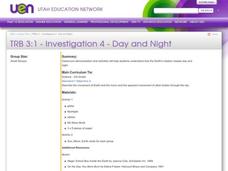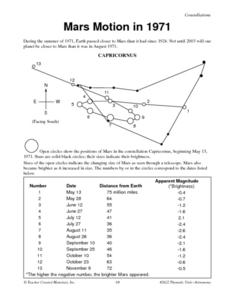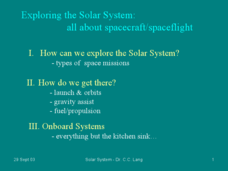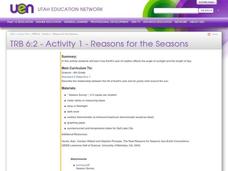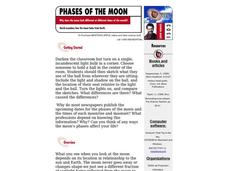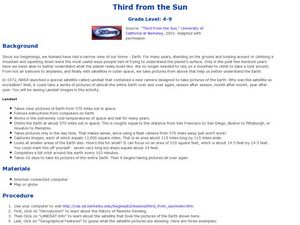Curated OER
Motion of the Sun and Earth: Using a Playground Model to Explore Rotation and Revolution
Learners experience the rotation of the Earth and the Sun and the Earth's revolution around the Sun, using a playground mode.
Curated OER
Solar System and Planets
Students identify the main components of the solar system. In this earth science instructional activity, students order the planets according to their distances from the Sun. They differentiate planets from dwarf planets.
Curated OER
Drawing Ellipses Lab
In this ellipse worksheet, students learn the difference between an orbit and an ellipse. They draw ellipses and calculate the distance between foci, they calculate the length of the major axis and they determine the eccentricity. They...
Curated OER
Reason for the Seasons
Learners study the seasons of the Earth. In this seasons lesson, students study the science of the seasons on Earth by studying the tilt and axis of the Earth's orbit. Learners read background information and four experimental activities...
Curated OER
Day and Night
Third graders view a classroom simulation that demonstrates how the Earth's rotation creates day and night.
Curated OER
Let's Think About Day and Night
Students explore day and night and the relationships between the Earth, the sun and the moon. They discuss the ways in which the sun and moon help us. They watch a short video that helps illustrate these concepts.
Curated OER
Seasons and Shadows: Investigate How Shadows Shift Throughout the Year
Pupils examine their shadows and why they are different in the summer and winter. In this seasons lesson students complete an activity to see how the earth's tilt on its axis changes the length of shadows.
Curated OER
Dimensions of the Solar System
A set of instructions that help learners draw concentric orbital arcs to scale of each planet. There is a table to complete with data and questions to check understanding of realistic orbits and relative sizes.
Curated OER
Mars Motion in 1971
In this science instructional activity, students read about the summer of 1971 when the Earth passed closer to Mars than it had since 1924. Students also learn about the retrograde motion of Mars as seen from Earth.
PBS
Experience a Solar Eclipse
Didn't catch the last solar eclipse? Now every day can be eclipse day, thanks to an interactive lesson plan from PBS' Space series for middle schoolers! The well-rounded multi-media experience includes video clips, an interactive, and...
Curated OER
Exploring the Solar System: All About Spacecraft/Spaceflight
Rarely do you find resources that reach high school astronomy learners. Here is something at their level! The physics of flyby missions is explained via several examples. Landing, penetrating, and roving spacecraft are examined. Diagrams...
Curated OER
Mercury
After reading a short excerpt about Mercury, your class will answer four comprehension questions. The worksheet challenges them to fold over the paper and answer the questions without referring back to the excerpt. An answer sheet is...
Curated OER
Solar Eclipse
Learners demonstrate the revolution of the moon around the earth and the effect of its direct alignment in between the earth and the sun.
Curated OER
Reasons for the Seasons
Sixth graders conduct and analyze a survey that explores public perceptions about the reasons for seasonal change. They measure the changing length of days, observe shadows and discuss how the Earth's axis of rotation affects the seasons.
Curated OER
Phases of the Moon
Students explore why when you examine the moon depends on its location in relationship to the sun and Earth. The moon never goes away or changes shape-we just see a different fraction of sunlight being reflected from the moon to Earth.
Curated OER
Cosmic Wheels
Students build a scale model of the Solar System and determine the time other planets take to travel around the Sun in comparison to the time of the Earth's revolution. The velocity of the planets are also determined in this...
Curated OER
Our Moon
For this space science worksheet, students use the clues given at the bottom of the sheet to solve the crossword puzzle on our moon. They name another name for the moon and the moon's gravity compared to that of the earth.
Curated OER
Earth and Seasons
Sixth graders comprehend that the path Earth takes as it revolves around the sun is called its orbit. They also comprehend that the axis is an imaginary line that passes through Earth's center and its North and South Poles. Students...
Curated OER
Third from the Sun
Students examine images from space. In this third from the Sun lesson, students examine images from, Landsat, the satellite launched by NASA in 1972.
Curated OER
Day and Night
Fifth graders investigate the Earth's rotation and revolution and the moon's orbit around the Earth. They participate in a class discussion about how night and day occur, and take notes. Next, they watch a video about the solar system...
Vosonos
Interactive Minds: Solar System
Travel through space as you learn about the galaxy, solar system, planets, and much more. An extensive resource for studying astronomy in upper-elementary and middle school classrooms.
Illustrative Mathematics
Solar Eclipse
Learners take on the role of astronomers, calculating conditions necessary for a total solar eclipse. Concepts of similar triangles and properties of circles come together as pupils create ratios and use real measurements in determining...
Curated OER
Who Wants to be a Millionaire: Solar System
Fourth and fifth graders will love showing what they know about the planets and our solar system. This game is fashioned after "Who Wants to be a Millionaire" and has the class work through fifteen different solar system related...
Curated OER
Observation and Inference
Assess your young scientists' understanding of the difference between observation and inference with this 20-question multiple choice quiz. It reviews a variety of physics and astronomy concepts, such as solar eclipses and sunspots, the...






